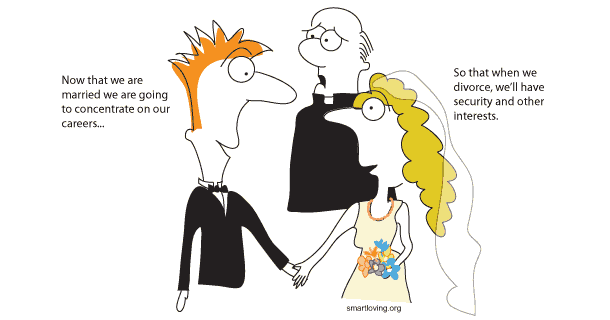Restoring hope in life long marriage

Life Long Marriage
There’s a curious thing that happens when a divorce touches a community. Where once parents, friends and siblings believed in the power of love and the permanency of marriage, confidence gives way to cynicism and uncertainty.
Instead of believing that children do best when living in the same home with both their parents, we find ourselves saying: “The most important thing is that they know they are loved by both their parents; it doesn’t matter if they all live together or not.”
Instead of upholding the vision of a couple devoting their lives to each other and growing gracefully into old age, we say: “People live so long these days it’s unrealistic to expect them to be happy with one person for their whole lives.”
Some people would say that such changes in attitude are a positive sign of growth and maturity: we are moving from an unrealistic, idealised notion to one grounded in reality; we are moving with the times. Those who refuse to abandon their ideals are seen to be ‘trapped in the past’ or ‘out-of-touch with reality’.
While this response is understandable, it is not helpful. Nor is it a mature one.
Misdirected compassion
Divorce creates a problem for us. On the one hand, we love and celebrate the optimism of weddings; we are filled with hope and good vibes as we witness the fervor of the bride and groom committing their lives to one another.
And so it should. Something important and profoundly sacred is happening. The couple is reaching for the divine, seeking to imitate God’s love in their own lives. God’s love is vast and unrelenting in it’s fidelity. It’s a beautiful thing and we join with all their family and friends in wanting to see them succeed.
On the other hand, a divorce contradicts this belief. Love is not permanent, vast, unrelenting, faithful. The hope we had is crushed by the reality of the disintegrating marriage.
This creates a cognitive dissonance for us; a mental contradiction that creates intense discomfort. It is a natural human reaction to want to avoid pain and suffering. In the face of the discomfort of cognitive dissonance, we search for ways to reconcile the conflicting beliefs and alleviate our pain.
In our compassion for those divorcing, we don’t want to add to their suffering or be judgmental. Nor do we want to stay in the uncomfortable space cognitive dissonance, of holding an ideal that is so hard for people to accomplish.
Redefining what is normal, or ideal, is one way of protecting ourselves from the discomfort of cognitive dissonance and from the fear of being perceived as judgmental.
Yet it is an immature and faulty reaction that ultimately leads to more divorce and more pain. It is immature because it denies the legitimacy of the pain we and our divorcing friends are experiencing.
Broken dreams hurt. There’s a grieving that must take place. And it’s painful, really painful. When we redefine the dream (or the ideal), we remove the legitimacy for our grief and bury the pain without allowing it to be processed.
In the short term, it feels like relief but this buried pain plays havoc with our subconscious and predisposes us to all sorts of hurt and self-harm in the longer term. We think we are being sensible and practical by moving on, but in reality, we are setting ourselves up for more pain down the track.
Restoring our Expectations for Success
If we don’t expect marriage to last a life time, then we won’t be disappointed when it doesn’t. If we don’t expect children to live with both parents, then we won’t be disillusioned when they can’t. These are self-protective strategies designed to deflect the pain of a divorce.
Unfortunately, this strategy usually delivers even more pain over the long term. Why? Because low aspirations lead to limited outcomes.
No successful athlete, artist, musician or business person has succeeded by aspiring to failure or mediocrity. If we don’t expect our marriage to last, chances are it won’t. If we don’t aspire to providing children the stability of both parents in the one home, we can be almost certain that we won’t.
The first step towards rebuilding marriage as a life-long commitment in our society is believing it is both possible and optimal. Pretending ‘it doesn’t really matter’ is unhelpful, to everyone involved.






Good article. We both come from families where our parents are divorced. This added to the secular society we live in makes marriage a daunting prospect. Everywhere you turn you will find things and people that would gladly assist in the destruction of your marriage. And since we are still newly married we sometimes feel that people will just assume that our mindset comes from naivete or inexperience. It’s nice to see something reminding us that it’s ok to have faith and believe God before you believe the world. Sufficient grace comes with the trial.
Very good. Premarital counseling should emphasize the life-long nature of marriage.